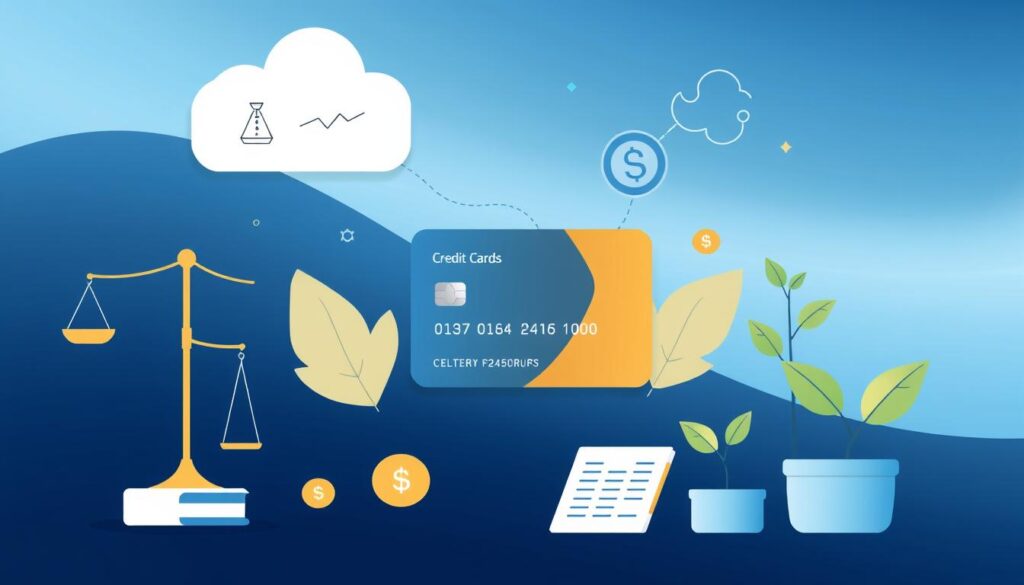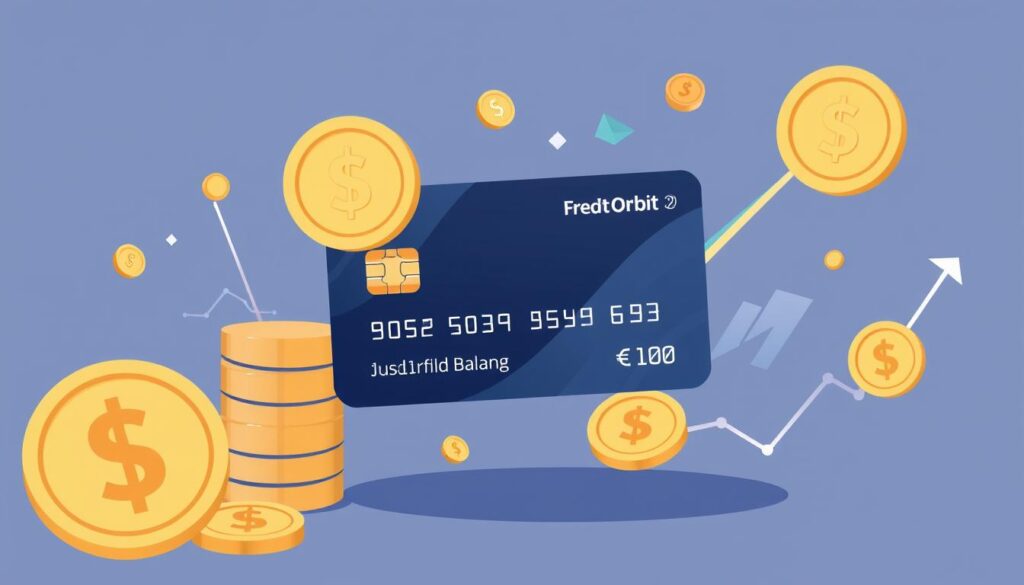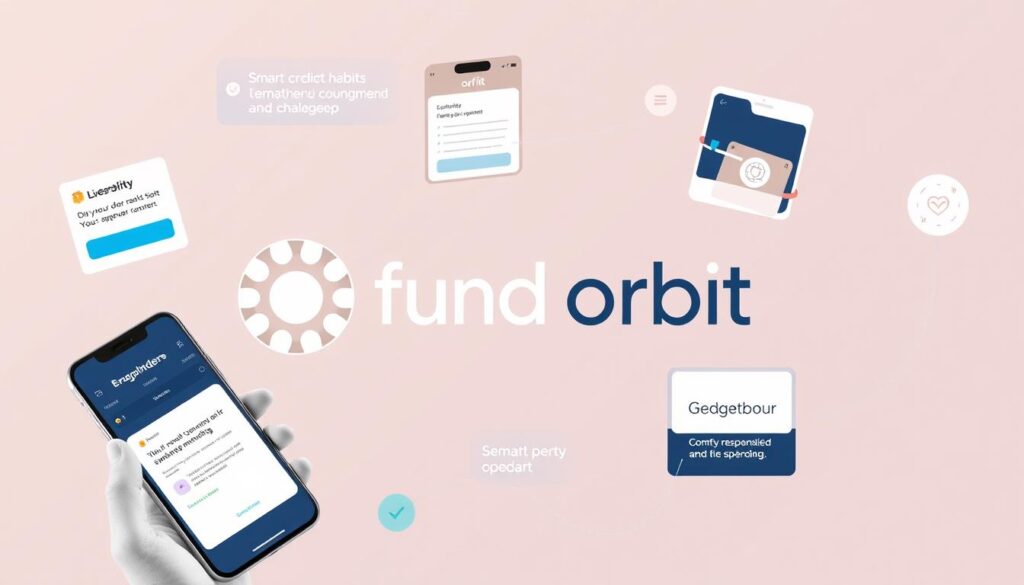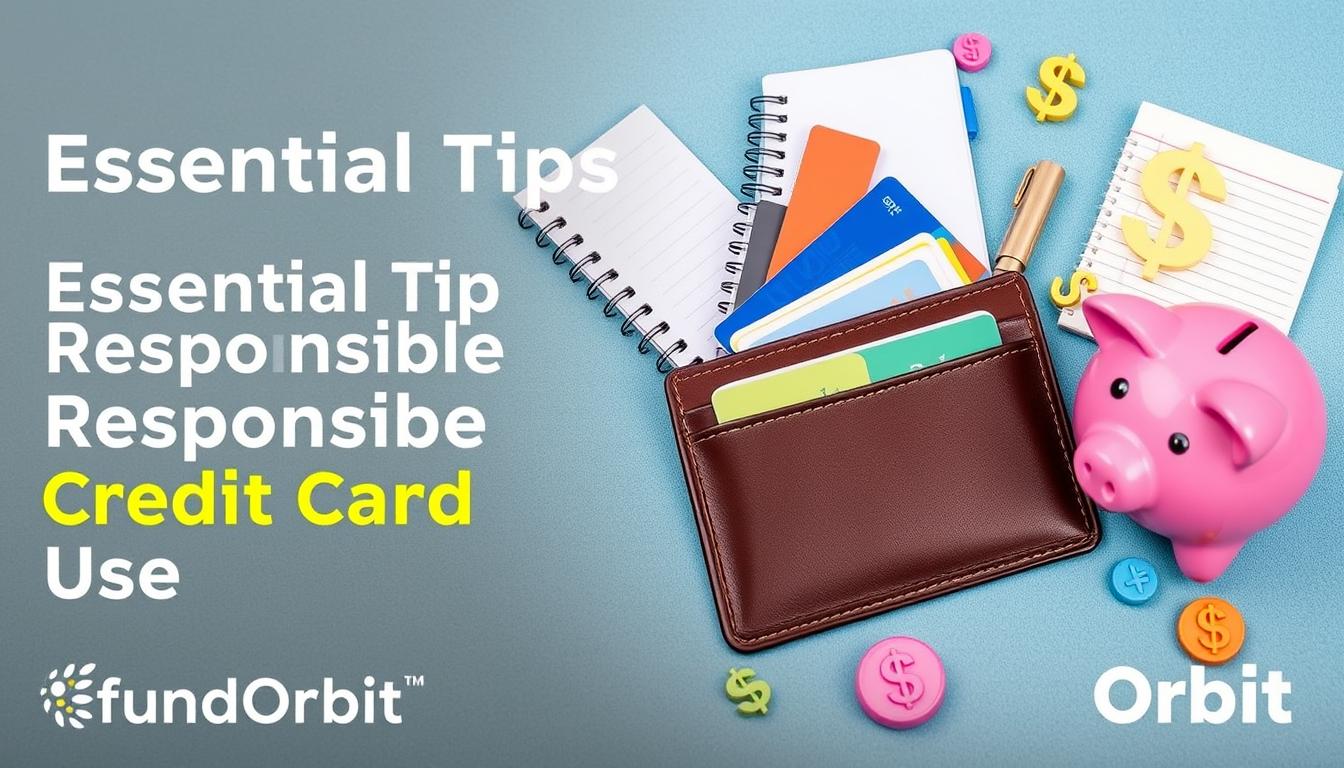Using credit cards wisely is key to managing money and boosting your credit score. With over 82 percent of Americans having a credit card, it’s vital to use them right. This helps avoid debt and keeps your credit score high.
We’ll look at how to keep your credit card use in check. Keeping balances under 30 percent of what you can use is a good rule. Also, checking your balance weekly helps track spending and catches fraud. These steps are part of using credit cards responsibly.
Learning the basics of credit card use is the first step to financial health. It’s important to follow best practices and tips for using credit cards well. This includes paying off your balance each month to avoid interest.
Key Takeaways
- Using credit cards wisely can help manage finances and positively affect credit scores by following tips for responsible credit card use.
- Keeping credit card balances below 30 percent of total available credit is recommended for maintaining a good credit score, a key aspect of credit card best practices.
- Regularly checking your credit card balance once a week can help manage spending and monitor for fraudulent purchases, a key tip for responsible credit card use.
- Paying off your balance in full each month can help avoid interest charges, a key credit card best practice.
- Following tips for responsible credit card use and credit card best practices can help reduce the risk of overspending and debt.
- Understanding credit card terms and conditions is essential for using credit cards wisely and avoiding unexpected costs, a key aspect of credit card best practices.
- Implementing a waiting period before making purchases can help reduce impulse spending by up to 40%, a valuable tip for responsible credit card use.
Understand Your Credit Card Terms and Conditions
Smart credit card habits start with knowing your card’s terms. This means understanding interest rates, fees, rewards, and grace periods. Knowing these details helps you make better choices, leading to good credit card management.
Knowing what your card offers can help you avoid extra costs. For example, knowing your interest rate helps you spend and pay wisely. About 30% of Americans carry a balance each month. The average American has around $5,500 in credit card debt.
Some important things to look at in your card’s terms include:
- Interest rates and fees: The average APR for credit cards is between 14% to 24%, based on your credit score.
- Rewards programs: About 59% of people use cards to earn rewards, with cash back being the most popular.
- Grace periods: This is the time between when you get your statement and when you must pay without interest.
By understanding your credit card terms, you can manage your card better. This leads to better financial health.
| Aspect | Importance |
|---|---|
| Interest rates and fees | High |
| Rewards programs | Medium |
| Grace periods | High |
Create a Budget for Your Monthly Expenses
To manage our money well, we must make a budget. It should cover our credit card payments and track our spending. It’s important to save enough for monthly payments and know how our spending affects our credit score.
For instance, if a credit card has a $2,000 limit, we should keep the balance under $600. Tools like CreditWise from Capital One help us check our credit score and spending. This way, we can make smart choices about our money.
Here are some tips to help you budget and track your spending:
- Set up spending alerts to keep an eye on your purchases and balance limits.
- Use automatic payments to avoid late fees and make sure you pay on time.
- Check your transactions weekly or monthly to stay on budget.
- Make a monthly budget and track your expenses to control your spending.
By following these tips and being financially responsible, we can keep our credit score healthy and avoid debt. 
| Credit Card Limit | Recommended Maximum Balance |
|---|---|
| $2,000 | $600 |
Remember, being financially responsible is key to a healthy credit score and avoiding debt. By budgeting, tracking our spending, and following these tips, we can use our credit cards wisely and reach our financial goals.
Use Your Credit Card Wisely
Managing credit cards well is key to a healthy financial life. It means being careful with how we spend and use our cards. This way, we can avoid buying things we don’t need and stay on track with our financial goals.
About 30% of people don’t pay their credit card bills on time. This can hurt their credit scores a lot. Paying on time is important, making up about 35% of your FICO score. To help, we can set reminders and use automatic payments to avoid missing payments.

Keeping our credit card use below 30% is also important. This helps our credit scores stay healthy. It’s also good to know about the fees and rules of our cards. Almost 30% of users don’t know about their card’s fees and rules. Being informed helps us use our cards wisely and avoid problems.
Avoiding Impulsive Purchases
To wisely use our credit cards, we should think before we buy. We should focus on what we really need and emergencies. Making a budget and tracking our spending helps us stay on track and avoid overspending.
Utilizing Credit for Emergencies Only
Using our credit cards only for emergencies helps us avoid debt. This keeps our credit use in check and helps our credit score. It’s a smart way to manage our finances and improve our financial health.
Pay Your Balance in Full Each Month
Managing credit card debt can be tough, but paying off your balance each month is key. This helps you avoid interest and keeps your credit score high. As paying off your balance in full each month can help you avoid interest charges, it’s essential to make it a priority.
Some tips for responsible credit card use include setting up automatic payments and tracking your spending. Avoiding impulsive buys is also important. By following these credit card best practices, you can make sure your credit card use is helpful, not harmful. For example, earning cash back rewards, like 4% on qualifying purchases up to $6,000, and then 2% after, is a big plus.

Regularly paying off your credit card balance in full can improve your credit score. This is because credit card issuers charge interest if you carry a balance. By paying in full, you avoid these charges and keep a good payment history. This makes lenders more likely to approve your applications and offer better terms.
Benefits of Paying Off Your Balance
- Avoid interest charges on your balance
- Maintain a low credit utilization rate
- Improve and maintain a good credit score
Avoiding Interest Charges
By paying your credit card balance in full each month, you avoid interest. This keeps your credit card use beneficial. This habit helps your long-term financial health and stability, allowing you to enjoy your credit card rewards and benefits fully.
Set Up Alerts and Reminders
To keep up with your credit card payments and spending, setting up alerts and reminders is key. This way, you can avoid missing payments. Being proactive with your finances is a big part of managing your credit card well.
Setting alerts for when bills are due helps you pay on time. This is important because payment history makes up 35% of your credit score. Also, getting notifications when you’re close to your spending limit helps you avoid extra fees.
Some benefits of using alerts and reminders include:
- Avoiding late payment fees and penalty APRs
- Keeping your credit utilization ratio below 30%
- Preventing over-the-limit fees and negative impacts on your credit score
- Staying on top of your payments and spending to develop smart credit card habits
By following these steps, you can manage your credit card better. This will help your financial health in the long run. 
| Alert Type | Benefit |
|---|---|
| Payment Due Date Alerts | Avoid late payment fees and penalty APRs |
| Spending Limit Notifications | Prevent over-the-limit fees and negative impacts on credit score |
Monitor Your Credit Card Statement Regularly
Practicing responsible financial behavior means keeping an eye on our credit card statements. This helps us spot unauthorized transactions and see how we spend. By watching our credit card activity closely, we can quickly find and fix any problems, like fraud or spending too much.
The Consumer Financial Protection Bureau says credit card companies can change our account terms anytime. So, it’s important to regularly check our statements. This way, we avoid missing important notices, which might be hidden in small print or written documents.
Here are some credit card utilization tips to remember:
- Check for unauthorized transactions
- Understand our spending patterns
- Monitor our credit utilization ratio
By following these tips and checking our credit card statements often, we can keep our finances in order. This ensures our credit card use helps us reach our financial goals. 
| Benefits of Monitoring Credit Card Statements | Importance |
|---|---|
| Detecting unauthorized transactions | High |
| Understanding spending patterns | Medium |
| Maintaining control over finances | High |
Take Advantage of Rewards and Benefits
Using credit cards wisely means managing them well. One smart way is to use rewards and benefits. Many cards offer cash back, airline miles, or retail points, which can save you a lot.
By understanding these rewards, you can get more from your card. For instance, a card with 2% cash back on all purchases can save you a lot if you use it for everything and pay it off each month.
Knowing What Benefits Are Available
To get the most from credit card rewards, know what’s available. This includes cash back, travel rewards, retail points, and more. Knowing the rewards program helps you use your card to earn more.
Maximizing Cash Back Opportunities
Cash back rewards are a favorite among many. To get the most, look for cards with high cash back rates, like 5% on certain purchases. Also, pay off your balance each month to avoid interest and keep your cash back rewards.
By following these tips, you can enjoy the rewards and benefits of your credit card. Remember, using your card wisely and responsibly is key to getting the most from rewards and benefits.
| Credit Card Reward | Benefit |
|---|---|
| Cash Back | 2% cash back on all purchases |
| Travel Rewards | 1 mile per dollar spent on travel purchases |
| Retail Points | 3 points per dollar spent at participating retailers |
Build Your Credit History Responsibly
Building a strong credit history is key to financial freedom. By using credit cards wisely, we lay a solid financial foundation. Credit card best practices like timely payments and low credit use are essential.
Important aspects of building your credit include:
- Paying your balance in full each month to avoid interest charges
- Keeping credit utilization below 30% to maintain a healthy credit utilization ratio
- Monitoring your credit report regularly to ensure accuracy and detect any possible issues
By sticking to these tips for responsible credit card use and credit card best practices, you can build a strong credit history. This will help you get better loan terms in the future. Always prioritize responsible credit card use and make smart financial choices.
| Credit Factor | Percentage of Credit Score |
|---|---|
| Payment History | 35% |
| Credit Utilization | 30% |
| Credit Mix | 10% |
Know When to Seek Help
Managing credit card debt can be tough, but knowing when to ask for help is key. If you’re always struggling to pay or falling behind, it’s time to act. There are many resources to help you get back on track and pay off your debt.
Credit counseling services offer great advice on budgeting and dealing with creditors. Debt consolidation loans can also help, by merging high-interest cards into one lower-interest payment. Taking these steps can lead to a better financial future and smart credit card habits.
You don’t have to handle credit card debt by yourself. Use the help available and ask for assistance when needed. This way, you can manage your credit cards well and reach your financial goals.


